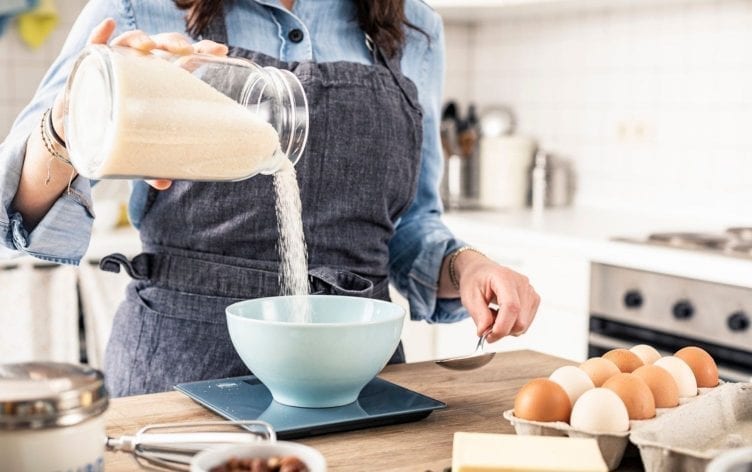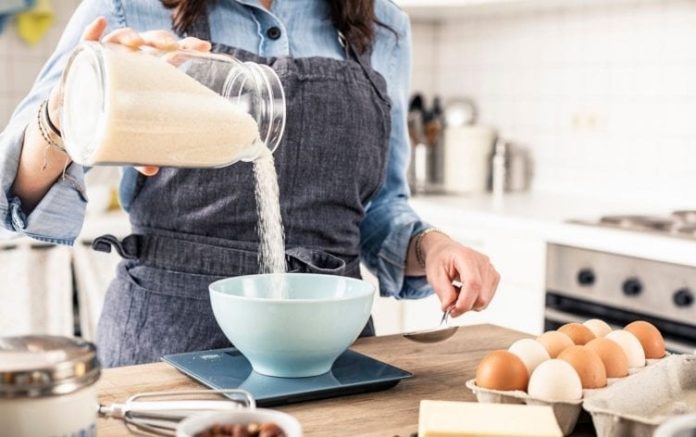
Why a Food Scale is Your Weight-Loss Secret Weapon
While it may not be as flashy as a fancy new activity tracker or workout gear, the food scale is a tried-and-true weight-loss tool that can help you reach your goals. “I always suggest people keep a food scale and use it on occasion to get an idea of how much they’re consuming,” confirms Lisa R. Young, PhD, RD.
Food labels don’t always provide accurate calorie counts, and most of us are notoriously terrible at guessing healthy portion sizes. That’s why weighing food is one of the best ways to ensure you’re keeping a more accurate food journal and remaining in the calorie deficit needed to shed pounds.
THE BENEFITS OF USING A FOOD SCALE
KNOWING EXACTLY HOW MUCH YOU’RE EATING
“Using a food scale eliminates the guesswork,” says Keith Ayoob, RD. While keeping a food diary is a science-backed method to lose weight, one of the most common complaints about food logging is you don’t actually know if your calorie counts are 100% accurate. With a food scale, you can be sure you’re recording the correct amount of food by weight. As you learn how much or how little you’re eating, you can adjust your calorie intake and macronutrients to better support your health goals.
LEARNING HOW TO EYEBALL PORTION SIZES
If you’re just beginning a weight-loss journey, “food scales, measuring cups and measuring spoons help you get familiar with what portions of different foods look like,” says Summer Yule, RD. We often think we’re eating much less than we are — especially when it comes to calorie-dense foods like nuts, nut butters and cooking oils or foods we tend to pile on like pasta and cereal. “It’s an eye-opener,” says Ayoob. “That famous ‘deck of cards’ portion size for 4 ounces of beef or fish becomes more meaningful when you’ve had the experience of weighing it out yourself.” Over time, the more you weigh your food, the better you’ll be at eyeballing portion sizes to avoid common mistakes.
FINDING OUT HOW LIGHT CERTAIN FOODS ARE
On the other hand, a food scale can also show you how other nutritious foods like leafy greens are hard to overdo. “I don’t care how much that spinach weighs as long as you’re eating lots of fruits and vegetables and not adding tons of high-calorie dressings,” says Ayoob. In this sense, a food scale can serve as a helpful reminder to enjoy more healthy foods.
IMPROVING YOUR BAKING SKILLS
A food scale is essential for getting measurements precisely right when cooking and baking. “The same volume of an item may have different weights depending on how tightly it was packed down,” explains Yule. “Using weights is a foolproof way to ensure recipe success.” Buy a food scale, and you can reward yourself for investing in your health by making some slim down-friendly treats like low-carb banana bread or chocolate-dipped meringues.
HOW TO FIND THE PERFECT FOOD SCALE
Registered dietitians agree the best food scales have a few things in common. Here’s what to look for as you shop:
- A scale that provides measurements in both ounces and grams for flexibility
- A tare weight function to set the weight at zero before you add food to a container ensures you’re only measuring the weight of the food
- An auto shut-off feature to preserve battery
- A large surface area for bowls and plates of varying sizes
- Affordability
Young recommends the GreaterGoods Digital Food Kitchen Scale. “It’s lightweight and affordable, uses grams as well as ounces and can be easily stashed away,” she says. The Ozeri Pronto Food Scale, Escali Primo Food Scale and the Etekcity Food Scale all fit the bill, too.
HOW TO USE A FOOD SCALE
To get started with a food scale, put it on a flat surface and give it a few seconds for the tare function to zero-out before adding food, says Ayoob. Weighing food before cooking is ideal, but if you forget, don’t stress; it’s more important to be consistent with food logging.
As far as how often you should use a food scale, that’s up to you. “There isn’t an exact right amount of time that everyone should use a food scale,” says Yule. You might want to try using it on and off to stay on track with your weight-loss efforts, when you need to figure out portion sizes you’re unsure about or just to make the perfect soufflé.
A good rule of thumb: “Use the food scale as long as it’s serving you well, and you’re benefiting from it,” says Yule. If you feel like you may be overdoing it or you’re obsessing over everything you eat, it might not be for you. Instead, you could try another avenue, such as the plate method or mindful eating. If you need help figuring out where to start, it’s always smart to reach out to a registered dietitian who can create a personalized plan.
Unlock an experience that’s like having a dietitian, trainer and coach — right at your fingertips. Go Premium for expert guidance and exclusive tools that will help you reach your personal health goals.












